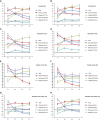Effect of a mentor-based, supportive-expressive program, Be Resilient to Breast Cancer, on survival in metastatic breast cancer: a randomised, controlled intervention trial
- PMID: 28926525
- PMCID: PMC5680471
- DOI: 10.1038/bjc.2017.325
Effect of a mentor-based, supportive-expressive program, Be Resilient to Breast Cancer, on survival in metastatic breast cancer: a randomised, controlled intervention trial
Abstract
Background: Because of medical advances, metastatic breast cancer (MBC) is now viewed as a chronic disease, rather than an imminent death sentence. Helping women live with this disease requires more than a medical approach to symptoms. Thus, a mentor-based and supportive-expressive program 'Be Resilient to Breast Cancer' (BRBC) was designed to help Chinese women with MBC enhance their resilience levels, biopsychosocial functions, and potentially extend their life span.
Methods: A total of 226 women with MBC were randomly assigned, in a 1 : 1 ratio, to an intervention group (IG) that participated in BRBC or to a control group (CG) that received no intervention. Be Resilient to Breast Cancer was conducted for 120 min once a week. Primary outcomes were cancer-specific survival and secondary outcomes were resilience, Allostatic Load Index (ALI), anxiety, depression, and quality of life (QoL). The Cox proportional-hazards model was used for survival analysis and growth mixture models were performed for secondary outcomes.
Results: Be Resilient to Breast Cancer did not significantly prolong 3- or 5-year survival (median survival, 36.7 months in IG and 31.5 months in CG). The hazard ratio for death was 0.736 (95% CI, 0.525-1.133, P=0.076; univariate Cox model) and 0.837 (95% CI, 0.578-1.211, P=0.345; multivariate Cox analysis). The IG improved in anxiety (ES=0.85, P<0.001), depression (ES=0.95, P<0.001), QoL (ES=0.55, P<0.001), resilience (ES=0.67, P<0.001), and ALI (ES=0.90, P<0.001) compared to CG.
Conclusions: BRBC does not improve survival of women with MBC in this study, though longer follow up is warranted. It positively impacts resilience, QoL, ALI, and emotional distress.
Conflict of interest statement
The authors declare no conflict of interest.
Figures



References
-
- Bonanno GA (2012) Uses and abuses of the resilience construct: Loss, trauma, and health-related adversities. Soc Sci Med 74: 753–756. - PubMed
-
- Connor KM, Davidson JR (2003) Development of a new resilience scale: the Connor-Davidson Resilience Scale (CD-RISC). Depress Anxiety 18: 76–82. - PubMed
-
- Campbell-Sills L, Stein MB (2007) Psychometric analysis and refinement of the Connor-Davidson Resilience Scale (CD-RISC): validation of a 10-item measure of resilience. J Trauma Stress 20: 1019–1028. - PubMed
-
- Edelman S, Lemon J, Bell DR, Kidman AD (1999) Effects of group CBT on the survival time of patients with metastatic breast cancer. Psychooncology 8: 474–481. - PubMed
-
- Edwards AG, Hailey S, Maxwell M (2013) Psychological interventions for women with metastatic breast cancer. Cochrane Database Syst Rev 6: CD004253–CD004253. - PubMed
Publication types
MeSH terms
LinkOut - more resources
Full Text Sources
Other Literature Sources
Medical

